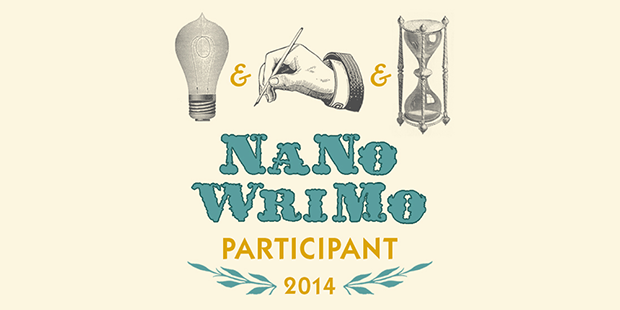
NaNoWriMo – Adapting the Metrics
By the book – pun intended – National Novel Writing Month is about banging out a lot of prose really fast. This focus on quantity can kickstart a project past an initial phase of blank page intimidation. It can also produce a mess without much potential for revision – fun, maybe, but not necessarily what you were going for.
Some NaNo’ers prefer an alternative measure of working time, commonly converted as some quantity of “words” per hour. Both metrics suit the inspirational asskick of a timed self-challenge, and both have their purposes and pitfalls. Neither are all things to every project. Which might work best for you?
Word Count
NaNoWriMo’s standard word count metric is ideal for bridging the gap between concept and implementation. Perhaps you have a detailed outline for 50,000 words’ worth of scenes. Perhaps you have enough sense of premise and direction to maintain the goal pace while generating satisfactory potential amid the expected roughness of a first draft. Or perhaps you just want to cut loose and see what happens.
And perhaps you wish to free yourself from pressure toward perfection – to recalibrate your expectations of an early draft. Raw, fast-paced word count is intended to pleasantly surprise you with the good stuff you gin up on the fly instead of frustrating you with the sense of failing at a hobby.
Without enough inspiration for specifics, you might stall for words or otherwise write a ton of material of minimal use to you later. I spent an entire NaNo writing backstory because I had no clue how to push my premise past its initial setup of conflict. I had fun. My draft still makes me smile with its bizarre asshat humor. Still, it calls for a do-over rather than a revision.
Quantity of Working Time
I like to keep my cruft-to-content ratio under control. I’m fine with a boring first attempt at a scene – not so much with bludgeoning through a multithreaded narrative deeply grounded in challenges of unfamiliar societies and institutions. Under the gun of More Words Right Now, I can’t seat-of-pants the nuanced weight of research and worldbuilding required for a reasonable first whack at such premise and development. I’d rather conjure up subtleties of character, clever turns of phrase, and other emergent goodies in the context of a rough concept that I can build on and refine.
Furthermore, a long-term writing habit requires regular work time. It also requires the understanding that said time might look unproductive on paper. Brainstorming and planning are worth far more than the word count of their resultant notes. Plot threads and conflicts can be tested and developed with high level outlines, increasing the chance that a first draft will have more useful material to revise than a heap of unwanted development to do over. This can fit with NaNo’s traditional freeing of self to Just Write Crap. Go ahead and brainstorm some wild hare of plot or characterization or back story. Even if it ends up in the slush pile, you might kick a mental gear loose somewhere.
A time goal can be difficult to catch up on if you get behind. Word count can come quickly with inspiration or add up in jottings over the course of a day. Time is non-negotiable and might involve some overhead of getting into a writing mindset.
Personal Experience
As a hesitant writer and NaNo neophyte, I liked pounding out words into Something rather than the blank slate I had formerly struggled to fill. Lately, I need a solid structure behind those words, even in their rough initial form. Tracking time helps me appreciate my efforts when brainstorming is slow to congeal into outline. It also enforces writing as a habit even when I lack inspiration. With enough plans in place, I could bring back some focus on word count to get over that wall between outline and prose.
[…] on writing as well. As one who plans key points of structure and builds out from those bones, I struggle with the discovery of potential through quantity that events like NaNoWriMo are meant to in…. I also struggle with finishing Good Enough for the Time Being. Write-O-Rama and Time-Limited […]